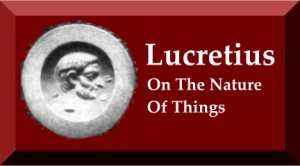Peace and Safety For Your Twentieth of January – The Limits of Education And the Need to Be “Well Constituted”
Peace and Safety to the Epicureans of today, no matter where you might be!
Happy Twentieth!
Today’s thought comes from 3 Lucretius, where the poet discusses that the nature of the mind, no less than the nature of the body, produces consequences – some of which can be altered and some of which can not. Here is the Martin Ferguson Smith translation:
It is the same with human beings. Although education may give certain people equal refinement, it cannot obliterate the original traces of each individual’s natural disposition. We must not suppose that faults of character can be extirpated, and that it is possible to stop one person from being excessively prone to sudden fits of rage, another from succumbing a little too readily to fear, and a third from accepting certain situations more meekly than one should. And in many other respects people must differ in character and consequently in behavior. But for the moment I cannot explain the secret causes of this variety or find names for all the atomic conformations that give rise to it. What I see that I can affirm in this connection is that the surviving traces of our natural dispositions which philosophy is unable to erase, are so very faint that there is nothing to prevent us from living a life worthy of the gods.
The central point for discussion today is that there are things that we can change, and things that we cannot. We don’t live in a fairy-tale world where we can choose to live forever, or where every disposition of character that arises from our makeup can be eradicated. On the other hand, we aren’t playthings of the gods, or at the mercy of deterministic destiny, who have no free will whatsoever. An intelligent person who seeks to follow nature and live happily is able and willing to take both factors into account and work with both truths to achieve a happy life.
Such is the way Diogenes of Oinoanda thought, and it is why he addressed his inscription “to those who are well-constituted.” Again, the Martin Ferguson Smith translation:
[observing that most people suffer from false notions about things and do not listen to the body] when it brings important and just [accusations] against the soul, alleging that it is unwarrantably mauled and maltreated by the soul and dragged to things which are not necessary (in fact, the wants of the body are small and easy to obtain — and the soul too can live well by sharing in their enjoyment — while those of the soul are both great and difficult to obtain and, besides being of no benefit to our nature, actually involve dangers). So (to reiterate what I was saying) observing that these people are in this predicament, I bewailed their behaviour and wept over the wasting of their lives, and I considered it the responsibility of a good man to give [benevolent] assistance, to the utmost of one’s ability, to those of them who are well-constituted.
There are indeed many things in life that we cannot change, but there are also many things that we can. Philosophy is not magic. Epicurus gives us not magic, but a very real key – through the study of Nature and the avoidance of wishful and groundless speculation – to know the difference.
_________
As Seneca recorded: Sic fac omnia tamquam spectet Epicurus! So do all things as though watching were Epicurus!
And as Philodemus wrote: “I will be faithful to Epicurus, according to whom it has been my choice to live.”


